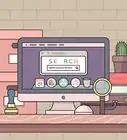This article was written by Adrian Klaphaak, CPCC and by wikiHow staff writer, Aly Rusciano. Adrian Klaphaak is a career coach and founder of A Path That Fits, a mindfulness-based boutique career and life coaching company in the San Francisco Bay Area. He is also is an accredited Co-Active Professional Coach (CPCC). Klaphaak has used his training with the Coaches Training Institute, Hakomi Somatic Psychology and Internal Family Systems Therapy (IFS) to help thousands of people build successful careers and live more purposeful lives.
There are 8 references cited in this article, which can be found at the bottom of the page.
This article has been viewed 6,164 times.
Are you itching to change jobs? Maybe you’re worried that you’re not growing anymore. A new job might be the best way to invigorate your career, and we’re here to help you decide if sending out job applications is the right choice for you. We’ll tell you exactly how long you should stay at your job, as well as how to decide if you should move on.
This article is based on an interview with our career coach, Adrian Klaphaak, founder of A Path That Fits. Check out the full interview here.
Things You Should Know
- 4.1 years is the median amount of time that employees stay at their jobs, but younger generations typically have shorter stays.
- Job hopping is becoming more common, though experts still recommend you stay at your job for at least a year if you can.
- It's generally okay to leave a job after a short tenure if something better comes along.
- You can explain away a short-term job by pointing out how it'll help you be an asset to your prospective employer.
Steps
Questions to Ask Yourself Before Leaving
-
1Will a new job help my career? Getting a new job may help you gain skills and experience that will help you reach your career goals. Additionally, you might encounter new challenges that add more purpose and meaning into your life. In some cases, staying at a job for too long can actually hurt your career because employers may think you just aren’t interested in growth.[5] Ask yourself follow-up questions like:
- What’s the next step I want to take in my career?
- Am I still growing in my current position?
- Do I feel challenged at work?
- What experience do I want to gain?
-
2Do I have career opportunities? Before you change jobs, find out what’s out there. Employment websites aren’t the only place you can look for jobs. Schedule informational interviews with people who work in your field to find out about potential opportunities and whether or not you’re a good fit for them. You could also reach out to your network to find out what’s available.
- If you learn about a job that interests you, save the information so you can apply for it.
-
3Do I have the skill set to get a job I want? Take a look at the job descriptions for positions that interest you to see if you need to expand your skill set. Compare your resume to the job descriptions to look for skill gaps that you might need to fill.[6]
- If you’re inexperienced in some areas, take classes so you can build new career skills. Bootcamps and certification programs are a great option for building your resume.
-
4Can I improve my current job? You may be able to get the change you crave in your current position. Talk to your boss about expanding your role or taking on new responsibilities. You could also try:
- Finding things within your job that are meaningful to you.
- Taking or initiating projects that interest you.
- Volunteering for teams you want to join or asking for reassignment.
- Making connections with your coworkers.
-
5Do I have opportunities for advancement in my current job? You may be able to get a promotion, so talk to your boss about opportunities that may be available. Be open to taking a job that might be considered a lateral move rather than a promotion. You might be on the same level, but it could be a great way to build out your resume and continue your career growth.[7]
- A new position might not be the best fit for you if you don’t like working for your employer. In that case, you might still prefer to explore other options.
-
6What is my industry standard? Each industry has its own standards for how long you’re expected to stay at a job. Some jobs have more frequent turnover than others.[8] As long as you’re in line with industry expectations, it’s okay to leave your job if that’s what right for you.
- Talk to your coworkers about how long they’ve stayed at each job.
-
7Will leaving make me look like a frequent job hopper? While a few short-term jobs won’t hurt your resume, employers might worry that you’ll be unreliable or less invested if you switch jobs several times a year. At the same time, the reason you’ve left is important. Most employers will understand if the job ended or if you left for a better opportunity.[9]
- Job hopping won’t look as bad if you don’t have gaps in your employment history. In that case, it shows that you’re jumping at opportunities and your skills are in high demand.[10]
-
8Am I leaving for a valid reason? The right job for you will be fulfilling because it plays to your natural strengths and values. Ideally, your career will connect to your passions or your sense of purpose. If your current job isn’t fulfilling you, you have a great reason to move on to a new opportunity.
- What are the right reasons to leave your job? In general, you should leave for things like a better position, more money, a better commute, or more flexibility.
- Similarly, you shouldn’t have to work in a hostile environment or with toxic coworkers.
-
9Will I be leaving on good terms? You don’t want to burn any bridges when you quit your job. To stay on good terms, tell your boss about your plans to move on, and give a 2 weeks notice if it’s possible. Additionally, thank your old employer for your tenure there, and make the transition as easy as possible for your coworkers. Finally, be honest about why you’re leaving with anyone who asks.[11]
- Your current employer might get upset about your decision to leave if you’re overly critical of the organization or if you leave them in the lurch.
-
10Am I ready for change? Moving to a new job won’t just change your workload. You’ll have a different commute, new coworkers, and a new routine. Before you apply for new jobs, make sure you’re ready for such a big change.[12]
- Change can be exciting! Sometimes you need a big jolt to feel excited about life.
How to Explain Short-Term Jobs
-
1Discuss how you grew from the experience. Employers are more accepting of job hopping if you’ve learned new skills or new things about yourself in each position. Explain any new skills you picked up during your short stint that you’ll take forward. Additionally, be honest about why the job wasn’t a good fit for you, and how that’ll help you commit to the right position.[13]
- “While I was only there for 3 months, I learned a new programming language during my tenure.”
- “During my 6 months in the position, I launched an entirely new youth advocacy program and developed the design skills necessary to create the launch campaign.”
- “I took the job because the project excited me, but the company’s workday structure stifled innovation. I realized that I need flexibility to be creative.”
- “Helping people is my most important value. Unfortunately, my last job didn’t allow me to help anyone, so I decided to find a position that will.”
-
2Point out your accomplishments. You can make a big difference in a short amount of time. Make a list of everything you did at your last job, and highlight your most important achievements in your interview.[14] Focus on the accomplishments that relate most to the job you want now so the interviewer will see your value to your prospective employer.
- “During my short tenure, I increased stakeholder engagement by 60% and conducted a survey to help choose the next project the department will take on. I believe my experience will help me connect to your client base quickly and make it easier for me to spot their needs.”
-
3Explain why leaving the position was right for you. Knowing yourself is a great quality to have, and employers are looking for it. Be honest about what didn’t work for you, such as the type of work you were doing or the structure of your workday. Then, tell your interviewer why the position you want will be a better fit for you.[15]
- “I took my last position because I love the company values. However, I felt like some people’s ideas were being ignored. I want to work for an organization that encourages people to speak up.”
- “I love the collaborative environment at my prior job, but projects seemed to progress too slowly. I thrive in a fast-paced environment, so I wasn’t feeling challenged.”
-
4Redirect the conversation to your future goals. Now’s your chance to show your prospective employer that you’re the best person for the job. Connect your career goals to the position that you want. Reassure the interviewer that you know what you want, and this position is perfect for you.[16]
- “Every job on my resume has led me to this position. This is my dream job, and I know I’ll be an asset to your company.”
- “Even though that job wasn’t the right fit for me, I’m glad I took it because it taught me lessons I can use here. I’m excited to start the next chapter of my career, and I hope it’ll be with your organization.”
References
- ↑ https://www.thehrdigest.com/how-long-should-you-stay-at-a-job/
- ↑ https://www.bls.gov/news.release/pdf/tenure.pdf
- ↑ https://hbr.org/2015/07/setting-the-record-straight-on-switching-jobs
- ↑ https://www.thehrdigest.com/how-long-should-you-stay-at-a-job/
- ↑ https://www.thebalancemoney.com/how-long-should-an-employee-stay-at-a-job-2059796
- ↑ https://www.thehrdigest.com/how-long-should-you-stay-at-a-job/
- ↑ https://hbr.org/2015/07/setting-the-record-straight-on-switching-jobs
- ↑ https://www.adp.com/-/media/adp/resourcehub/pdf/adp%20the%20state%20of%20hr%202019.ashx
- ↑ https://www.thebalancemoney.com/how-long-should-an-employee-stay-at-a-job-2059796
- ↑ https://www.thebalancemoney.com/how-long-should-an-employee-stay-at-a-job-2059796
- ↑ https://hbr.org/2014/12/how-to-quit-your-job-without-burning-bridges
- ↑ https://www.thehrdigest.com/how-long-should-you-stay-at-a-job/
- ↑ https://www.cnbc.com/2022/03/21/quit-your-job-after-less-than-a-year-how-to-discuss-it-in-interviews.html
- ↑ https://www.thebalancemoney.com/job-hopper-resume-tips-4025412
- ↑ https://www.cnbc.com/2022/03/21/quit-your-job-after-less-than-a-year-how-to-discuss-it-in-interviews.html
- ↑ https://www.cnbc.com/2022/03/21/quit-your-job-after-less-than-a-year-how-to-discuss-it-in-interviews.html
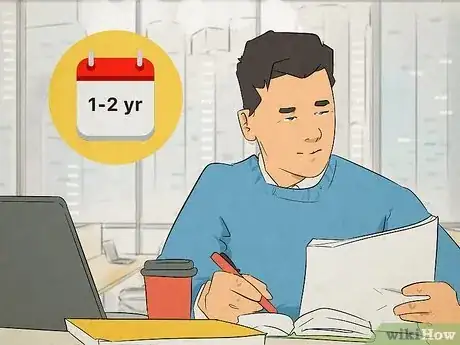
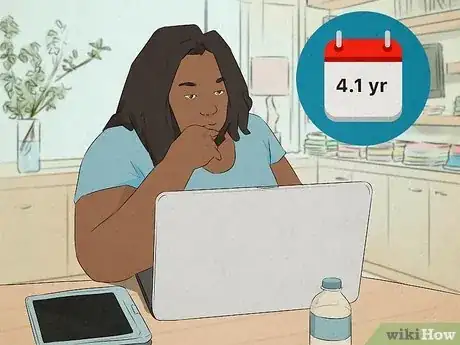
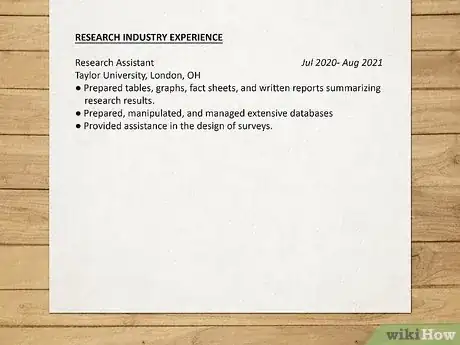











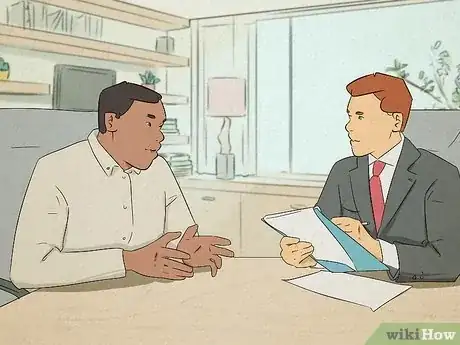


-Step-9.webp)
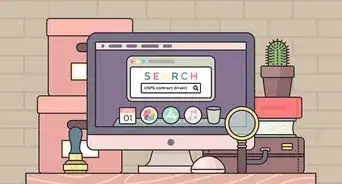











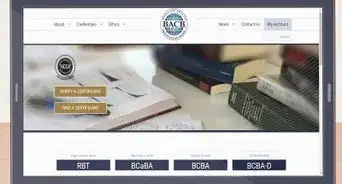







-Step-9.webp)
